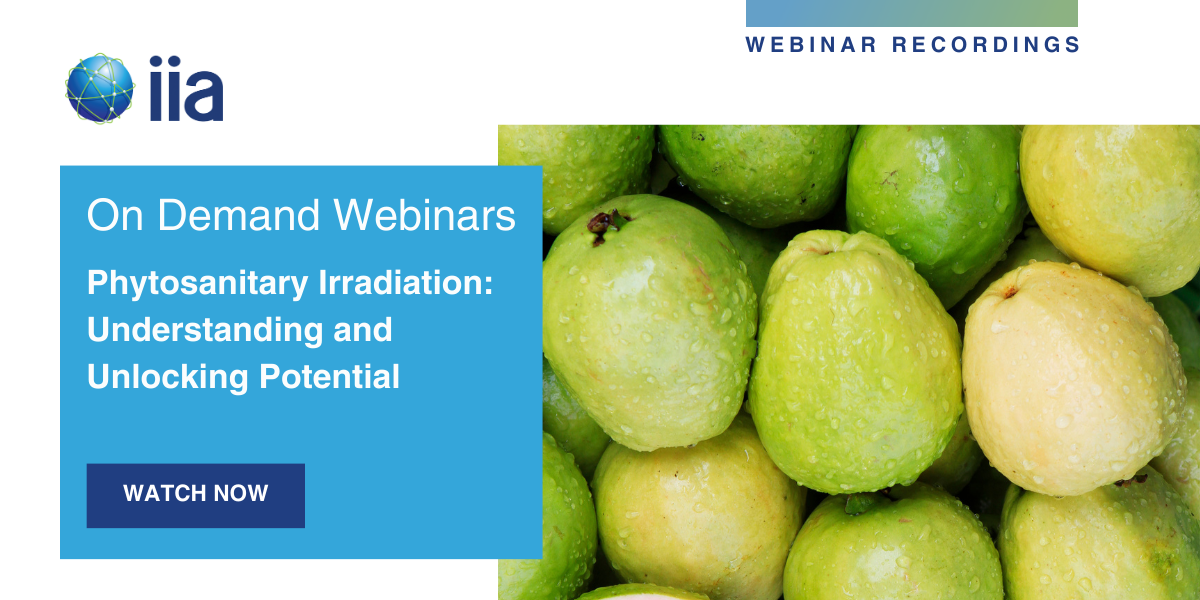
‘Phytosanitary Irradiation: Understanding and Unlocking Potential’ Webinar Recordings
The iia would like to thank everyone that attended the Phytosanitary Irradiation Platform’s (PsIP) live three-part webinar series that took place 16 & 30 August and 6 September. We would also like to thank Ariadnne (PsIP lead) for hosting the successful events, as well as our guest presenters Yves Henon, Sally Ormiston, and Laura Jeffers. All three webinars are now available to watch on demand, further information and links to the recorded webinars are below.
Webinar 1: ‘Phytosanitary Irradiation: Overview, Challenges and Opportunities’
Presented by Yves Henon, iia Board Member.
“A method nearly unheard of two decades ago, irradiation has now found its place amongst chemical and non-chemical phytosanitary measures that provide biosecurity in international trade of fresh fruit and vegetables. The global trade of irradiated produce has now reached significant volumes. Irradiated fresh produce looks good, tastes good, is exempt from post-harvest treatment residues, and is affordable. This has been recognized by growers, traders, retailers and consumers in a dozen countries. Will phytosanitary irradiation keep growing at the current pace? Non-science-based regulations appear to be the main obstacle to expansion. On the other hand, the simplicity of the process, its efficacy and competitive advantages for the environment are serious assets for the future. To make the most of these advantages, international cooperation needs to be continued and expanded.”
Webinar 2: ‘Phytosanitary Irradiation – An Australian perspective’
Presented by Sally Ormiston, Department of Agriculture, Fisheries and Forestry of Australia.
“In an increasingly complex biosecurity and trade environment, tools such as irradiation will play an increasing role in supporting the movement of fresh produce both domestically and around the globe into the future. We will share insights into the trade policy perspective of the Australian government, the regulatory landscape supporting use of irradiation in Australia, and where the future opportunities lie.”
Webinar 3: ‘USDA APHIS PPQ Phytosanitary Irradiation Programs: Strong Roots and Still Growing’
Presented by Laura Jeffers, USDA APHIS Senior Risk Manager.
“As trade ever grows, so do the opportunities for the movement of exotic pests on international cargo. Phytosanitary quarantine treatments are the last resort when in-country agricultural practices cannot entirely mitigate pest risk on commodities. For the U.S., phytosanitary irradiation treatments were first used with markets where traditional treatments, like methyl bromide fumigation or in-transit cold treatment, were unavailable or unsuitable. Now with 20+ years of experience, USDA APHIS PPQ looks to the future for this promising technology.”
Join PsIP free of charge
By joining PsIP you will become part of this community and will help to demonstrate that there is depth in expertise around the world.
The PsIP seeks to bring together a wide variety of stakeholders. This community is expected to include the horticulture trade (growers, importers, exporters), international organizations (IPPC, Codex Alimentarius, IAEA), government regulators (health and biosecurity), treatment providers (processors, source and technology providers), retailers and researchers (post-harvest and pest management, efficacy).